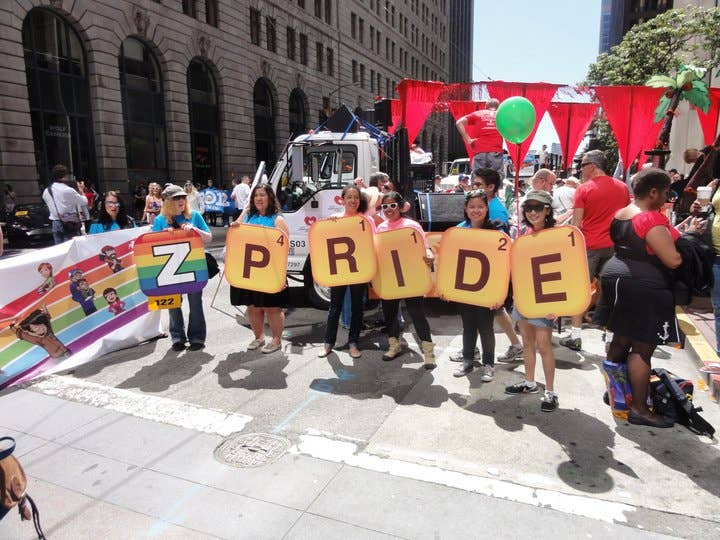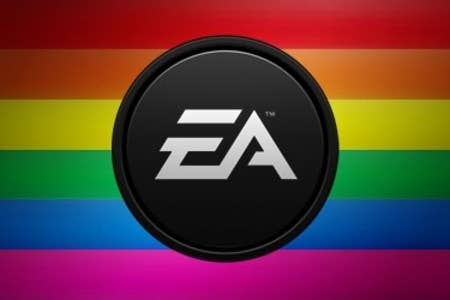Publishers: LGBT Equality is "Civil Rights Issue of Our Time"
EA, Zynga talk about reaction to, and reasons for, stances against Defense of Marriage Act
Earlier this year, regional fast food chain Chick-Fil-A found itself at the center of a national controversy for its opposition to same-sex marriage. The company's stand on a divisive social issue made headlines for months, sparking boycotts and affecting the purchasing decisions of people on both sides. Whether one thought the company's position was principled or prejudiced, it was less than surprising coming as it did from a privately owned business whose management had a history of mixing personal beliefs with corporate policy (none of the chain's locations are open on Sunday). But at the same time as the Chick-Fil-A controversy was gathering steam, a handful of game publishers were taking their own stand on the gay marriage issue.
On July 10, dozens of high-profile companies, firms, civic organizations, and cities filed an amicus brief against the Defense of Marriage Act, which would legally define marriage as needing to be between one man and one woman. GamesIndustry International recently spoke to representatives from two publicly traded companies who signed on to the brief, Electronic Arts and Zynga, to ask them about the backlash their positions generated, from customers, employees, and investors.
"Zero," was how Zynga general counsel Reggie Davis described the blowback to the company's anti-DOMA stance. "None. Not a peep from investors, from the press, or internally."
"We're very vocal about our position, and people ultimately have an option to invest in the company or not."
Zynga's Reggie Davis
Electronic Arts head of global diversity and inclusion Ginger Maseda described a similar situation at EA, saying positive comments "far outweigh" negative comments across the board. And when it comes to the shareholders, she needed no such qualifiers.
"There have been no questions, comments or concerns raised from our investors with regards to support for LGBT initiatives in the community or having LGBT characters in our games," Maseda said, casting a net beyond DOMA and into the company's decisions to celebrate Pride Month and allow gay player characters in Star Wars: The Old Republic. "Essentially, it's been a non-issue from an investor perspective."
While the two publishers saw similar reactions to their anti-DOMA positions, they were less in tune on whether to portray it as a rare example of corporate courage to do the right thing regardless of risk to the bottom line. Davis didn't mince words on the topic, calling LGBT equality "the civil rights issue of our time."

"There are 13, 14, 15-year-old boys and girls committing suicide throughout a lot of the country because they can't come to grips in their community with being who they are," Davis said. "And to me, it just takes the whole debate around 'some people don't agree with it,' or 'you're a public company; should you not do this because of your full representation to your shareholders?' We're very vocal about our position, and people ultimately have an option to invest in the company or not. As long as there's good disclosure around what your commitments are at the company, then people can make informed decisions as to whether they want to invest in you or not."
For EA's part, Maseda stressed that the publisher is trying to be inclusive in all things, and "part of inclusion is making everybody feel heard and that they have a voice." However, she added, "As a publicly traded company, I think it's important to listen to our consumers. Whether we believe it's right or wrong, it's all incorporated into what we do."
"As a publicly traded company, I think it's important to listen to our consumers. Whether we believe it's right or wrong, it's all incorporated into what we do."
EA's Ginger Maseda
Despite the lack of furor over LGBT support in the industry, Davis isn't ready to call this civil rights struggle won.
"We're trying," Davis said. "We're doing the best we can, but we as a world have a long way to go about being truly enlightened about this issue and other issues. I don't think there's time for us to spend a lot of time patting each other on the back about how enlightened we've all become, and would rather focus on what are the core battles, what are the decisions we need to win, and make it the law of the land that you can't discriminate and you must recognize marriages between two people of the same sex throughout the US. And we've got a ways to go still; this is not a slam dunk."
The general acceptance of LGBT communities in the gaming industry doesn't end with these two publishers. Gaymercon co-founder Benjamin Williams said that his efforts to launch the first convention specifically for the gay gamer community have met with universal approval from developers and publishers. Williams said that when he would approach companies about the convention, the most common reaction was simply, "How can we help?" That help arrived in a number of forms; EA has already signed on to be an exhibitor when the inaugural show launches next year in San Francisco, and Microsoft (another signee on the anti-DOMA amicus brief) promoted the show to its Xbox Live audience when it was just a Kickstarter project. (The organizers were asking for $25,000; they raised over $91,000.)

Even so, Williams isn't quite ready to call the industry enlightened. Even if the people who create and publish games have come to support the LGBT community, it's still common for harassment to come from other gamers. He generally stays away from online games, saying he prefers not to wade into "that mire of awfulness" where homophobic slurs are as common as first-person shooter sequels. Beyond that, he argues these companies should go a step beyond acknowledging the LGBT community and start making games for them.
"One of the things that's happened in the industry is that developers have this stereotype of who they think their audience is," Williams said. "They think their audience is straight guys who like a particular type of game. Then once they look at their sales figures and it says, 'Straight, middle-class white guys bought our game so that's our population.' Well yeah, they're the ones who bought your games because that's who you made it for. If you made it for a wider audience, you would find that your customer base is much wider. It's not just the stereotypical gamer population; it's women gamers, it's gay gamers, it's trans gamers. There's a much bigger customer base to take advantage of out there."
And that's an argument that should interest EA and Zynga shareholders, even if their stances on DOMA don't.
CORRECTION: This article originally suggested that same-sex options had already been included in Star Wars: The Old Republic. BioWare has said it will include those in the future, but has not yet implemented them.

